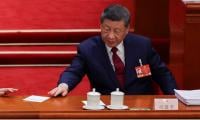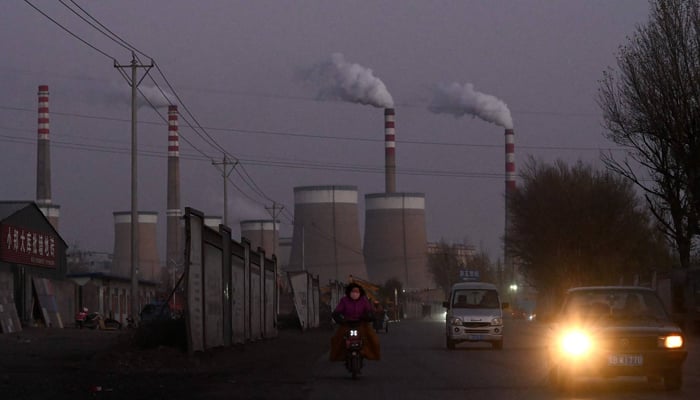A security threat
In 2007, the UN Environment Programme (UNEP) concluded in a study about Sudan that the conflict in Darfur was primarily driven by climate change and warned that any change in weather patterns could trigger a succession of wars across Africa.
Today, there is a genocide going on in Darfur. According to American economist Jeffrey Sachs, places like Darfur are ecological disasters first and political disasters second.
Agricultural economist Marshall Burke says that with the rise in temperature, crop yields decline and rural incomes fall, making it more likely for the disadvantaged rural population to pick up arms to fight for their survival.
Climate change has increased global migration. This has strained the resources of host communities, increasing the likelihood of armed conflicts and turning the situation into a serious security threat.
Sudan, Indonesia and Pakistan – three Muslim-majority countries – have faced civil wars over the years, resulting in the birth of South Sudan, East Timor and Bangladesh.
Pakistan continues to not prioritize climate change as a security threat even though the Bhola Cyclone of 1970 was instrumental in the fall of Dhaka. After the cyclone, the government’s failure to respond promptly caused East Pakistanis to complain against the unfair and discriminatory behaviour by the government towards them.
Similar behaviour was also seen when the Black community of New Orleans blamed the US government for racism against them due to the government’s poor relief response to Hurricane Katrina in 2005.
Regarding the Bhola Cyclone, the book ‘The Vortex: a True Story of History’s Deadliest Storm, an Unspeakable War, and Liberation’ by Jason Miklian and Scott Carne aptly explains how the world’s deadliest storm in modern history divided Pakistan and led the world to the brink of nuclear war. This threat came years after the Cuban missile crisis in 1962 when the US and the former Soviet Union forces converged in the Bay of Bengal.
After the fall of Dhaka, the National Assembly of Pakistan passed the 1973 constitution in April 1973 but did not recognize environmental rights. In Bangladesh, the Sheikh Mujibur Rahman government fell in 1975 due to its failure to govern and imposing emergency to control unrest as the southern part of the country had not recovered from the destruction caused by the cyclone.
But Bangladesh learnt from its past mistakes and recognized its rivers as living persons; Pakistan still refuses to treat climate change as a security threat.
Manik Bandopadhyay’s Bengali novel ‘Padma Nadir Majhi’ discusses the hardships of Bengal’s fishermen during the British Raj. The book was later made into a movie called ‘Jago Hua Savera’ by Faiz Ahmad Faiz. The novel describes that even after the departure of the British from the Subcontinent, the condition of fisherfolk in East Pakistan did not improve. These people became disillusioned with the government and the situation worsened in the aftermath of the Bhola Cyclone.
In Pakistan, due to the erosion of the Indus Delta, the fisherfolk community along River Indus has also become disillusioned with the government for its failure to protect the Indus. In 2022, a protest was held against the restrictions on fisherfolk from Sindh to enter Balochistan waters, highlighting a potential conflict between the fisherfolk communities of both provinces. Gwadar’s fisherfolk community has continuously raised its voice for its rights and protections against foreign fishing trawlers.
Sindh was hit the hardest by the 2022 floods as casualties rose to 799. Around 4.4 million acres of agricultural land was destroyed, making the people of Sindh angry over the government’s poor relief response.
Pakistan, thus, needs to recognize climate change as a serious security threat on a priority basis.
The writer is a lawyer and a faculty member at the Department of International Relations, University of Karachi.
-
 OpenAI Annualized Revenue Hits $25 Billion Milestone Amid Global Adoption Surge
OpenAI Annualized Revenue Hits $25 Billion Milestone Amid Global Adoption Surge -
 Billy Porter Claims He Came Back From The Dead Amid Sepsis Battle
Billy Porter Claims He Came Back From The Dead Amid Sepsis Battle -
 Harry Styles Hints He's Ready For Marriage And Family Life
Harry Styles Hints He's Ready For Marriage And Family Life -
 David Harbour’s Ex Faced Extreme Humiliation At Lily Allen’s Producer's Birthday Bash
David Harbour’s Ex Faced Extreme Humiliation At Lily Allen’s Producer's Birthday Bash -
 China Targets Tech Innovations Amid High Stakes Rivalry With US: Key Strategies Explained
China Targets Tech Innovations Amid High Stakes Rivalry With US: Key Strategies Explained -
 Pacers Vs Clippers: Kawhi Leonard Powers Clippers Past Pacers For Third Straight Win
Pacers Vs Clippers: Kawhi Leonard Powers Clippers Past Pacers For Third Straight Win -
 Scientists Build Tiny AI Brain Model Using Monkey Neurone Data
Scientists Build Tiny AI Brain Model Using Monkey Neurone Data -
 Oil And Gas Price Spike Might Lead Countries To Seek Alternative
Oil And Gas Price Spike Might Lead Countries To Seek Alternative -
 China Grapples With Slowest Economic Growth In Decades Amid Global Pressures
China Grapples With Slowest Economic Growth In Decades Amid Global Pressures -
 Jonathan Castagna Included In Flames’ Massive Trade That Sends MacKenzie Weegar To Utah
Jonathan Castagna Included In Flames’ Massive Trade That Sends MacKenzie Weegar To Utah -
 Marlon Wayans Drops Bombshell Statement About 'cancel Culture' Ahaed Of 'Scary Movie 6'
Marlon Wayans Drops Bombshell Statement About 'cancel Culture' Ahaed Of 'Scary Movie 6' -
 Steve Daines Will Not Seek Reelection As Trump Endorses Kurt Alme
Steve Daines Will Not Seek Reelection As Trump Endorses Kurt Alme -
 Khloe Kardashian Considering Having Third Child 'on Her Own'
Khloe Kardashian Considering Having Third Child 'on Her Own' -
 Nick Blankenburg Acquired By Avalanche From Predators In NHL Trade Deal
Nick Blankenburg Acquired By Avalanche From Predators In NHL Trade Deal -
 Cardi B’s Ex Steffon Diggs Faces Major Setback Post Breakup
Cardi B’s Ex Steffon Diggs Faces Major Setback Post Breakup -
 Hornets Vs Celtics: Charlotte Earns Sixth Straight Win In 118-89 Victory
Hornets Vs Celtics: Charlotte Earns Sixth Straight Win In 118-89 Victory




